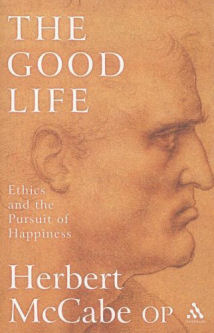
|
Posted September 18, 2005
Book: The Good Life: Ethics and the Pursuit of Happiness Author: Herbert McCabe, OP Continuum, New York, pp. 125 An excerpt from the Jacket:
This small masterpiece by the late Fr. Herbert McCabe of the Dominican Order steers a steady course between these two extremes. We feel instinctively that human beings are designed to enjoy themselves and to be happy and yet we are told that suffering is good for the soul. But in the Catholic tradition the true object of human existence is the vision of God, and nothing less than this will ever make us truly happy. But Fr. McCabe explores much deeper issues. Is happiness a pleasure or a pain? You hardly know. Certainly it is not a comfort, for comfort spells security and happiness can take you out of yourself to a degree where all security is left behind. Behind a feeling of exultation, you can sense the flame of incandescent terror. An excerpt from the book: In this book I want, among other things, to talk about the way we praise or blame other people and ourselves, about the way we think of some people as good and others as not so good. So I am concerned with ethics. And I start from the presupposition that praising and blaming is a perfectly sensible activity, that it is not like predicting the future from the dimensions of the great pyramid, or seeking to cure diphtheria by incantations at the time of the full moon, or hoping to defend your country by the use of nuclear weapons (all of which belong to the realm of magic rather than rationality). Praising and blaming (especially blaming) can be carried to excess or indulged in inappropriately. For now, though, I take it that they are ordinary and necessary human activities. We may know reasonably well how to praise and blame without studying ethics --- just as we may speak quite grammatically without ever having studied grammar. But the study of ethics, like grammar, is useful for at least two reasons. First, it is always satisfactory to see the reasons and principles and patterns behind what we do. Secondly, even though we speak quite grammatically for the most part, there may be times when we make mistakes or are puzzled about some linguistic form. And a study of grammar will help us to avoid mistakes in these cases. It might lead us to see that, if we are to be consistent with our own general practice, it is this we should say and not that. By the same token, the norms of traditional morality, like those of grammar, are never stable, and never quite adequate to deal with new forms of human behavior. So we need some way of determining what is a growth in our understanding and what is merely a decay, what, in the case of grammar, is a new and linguistic form, and what is mere slovenliness. Table of Contents: 1. The study of ethics 2. The good life 3. Politics and virtue 4. Organism, language and grace 5. Unpublished articles by Herbert McCabe ‘Virtue and Truth’, ‘Animals and Us.’ |
|
